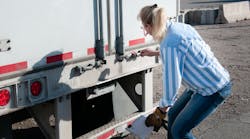Today, the words diversity and inclusion go hand in hand. Without an inclusive culture it’s impossible to maintain diversity within any business operation. That’s particularly important for the trucking industry, which has a growing labor shortage and hasn’t traditionally been known as the most diverse industry.
U.S. Bureau of Labor Statistics data for truck transportation in 2020 show that women make up just 12.4% of trucking’s workforce. In addition, 76.6% of the industry is white, 17.1% Black, 3.6% Asian, and 22.6% Hispanic or Latino.
Right now, commercial trucking is competing with other industries in a tight labor market, in which more than 10 million jobs need to be filled. And as Glassdoor pointed out, more than three out of four job seekers and employees report that a diverse workforce is important when evaluating companies and job offers.
“The business environment has moved faster than ever, so you have to have diversity of ethnicity, diversity of gender, diversity of thought, and diversity of experience,” Eric Fuller, CEO of U.S. Xpress, explained during the recent American Trucking Associations’ 2021 Management Conference & Exhibition (MCE) in Nashville.
“It really starts with the diversity of thought, and we are moving more towards intentional diversity,” Fuller added.
A few years ago, U.S. Xpress made an “intentional shift” toward technology and has focused on recruiting a younger workforce with artificial intelligence, machine learning, and deep predictive analytics knowledge and experience. As one of the largest carriers in North America, U.S. Xpress runs a fleet of about 7,000 tractors and 15,500 trailers.
“We are trying to keep up with startups that are venture-capital backed, as we are seeing more and more of that in our space,” Fuller pointed out. “Most people coming out of college are looking for a diverse workforce, a diverse company, a diverse industry, and you’re seeing that across the board.
“We are very open about our intention to be more diverse,” Fuller added. “We’ve had a number of candidates that we tried to hire who are unwilling to come to U.S. Xpress because of their perception about the industry and their perception about the community we are in.”
U.S. Xpress is based in Chattanooga, Tennessee, which doesn’t have the most diverse reputation, Fuller noted. So, convincing applicants to relocate from cities like New York or Atlanta have been a challenge.
Total Transportation of Mississippi is headquartered in the more diverse area of Jackson, Mississippi, according to John Stomps, president and CEO. That, Stomps said, has made recruiting a more diverse workforce much easier.
The carrier, which runs 913 trucks and employs some 1,600 people, has a team that specializes in going to historically Black colleges and universities in the area to speak about and promote the trucking industry. The company, which also touts having nearly three times more female drivers than the national average, focuses on hiring the best people no matter who they are.
“It’s easy to be diverse,” Stomps said during MCE 2021. “Inclusion, however, is a culture, and you’ve got to have that from the top down. You’ve got to have a commitment from your people, and it better start at the top. If your people don’t believe in it, then you will have a problem keeping people around.”
Creating an environment where people feel they are supported and where there is infrastructure to support them also is important, Fuller noted. For example, if a company has a higher percentage of Spanish-only speaking employees, the company must make sure its HR processes, company guidelines, and overall culture also reflect those employees’ needs.
“Without inclusion, that diversity goes away when they feel they have no support,” Fuller said. “You can’t have one without the other. Unfortunately, you see a lot of companies that go with the diversity piece and don’t follow through with inclusion.”
A business imperative
When it comes to return on investment, Fuller said implementing an intentional culture of inclusion and diversity is well worth it.
“Younger people want a diverse community, a diverse workforce, a diverse company that they can go to,” Fuller stressed. “You will not make it for the next 20 years if you don’t have an intentional approach around inclusion and diversity. It is a business imperative. If you don’t set up that environment within your company and people start to retire, those younger people are not going to want to work for you, and it’s going to have an impact.”
Stomps added that fleets should keep an eye on their customers’ demographics and expectations for working with diverse companies as well. According to McKinsey & Company research, corporations identified as more diverse and inclusive are 35% more likely to outperform their competitors.
It’s also worth pointing out that 74% of millennial employees believe their organization is more innovative when it has a culture of inclusion, and 47% look for diversity and inclusion when sizing up potential employees, according to Deloitte.
Moreover, the newer generations of talent entering the workforce today seek a career path, and they want to know exactly what that career path will look like right off the bat, Stomps advised.
“Those who were coming into the workforce 20 years ago and beyond would go into a company and work there for 40 years. The generation that comes in today only wants to work for a company for three to five years,” Fuller explained. “They are not looking to stay with you, and you have to accept that. That has been a hardship for us and some of our executives—investing in somebody that comes in and says, ‘I am only going to work for you for five years, then I am going to do something else.’ In the past you would not invest in that person.'"
“We had to be very intentional about how we set up our career path and be very open about that and accepting of that,” he urged. “As a company, we have to be much more flexible for what doesn’t fit our norm and what we have been used to because things are moving so fast.”




